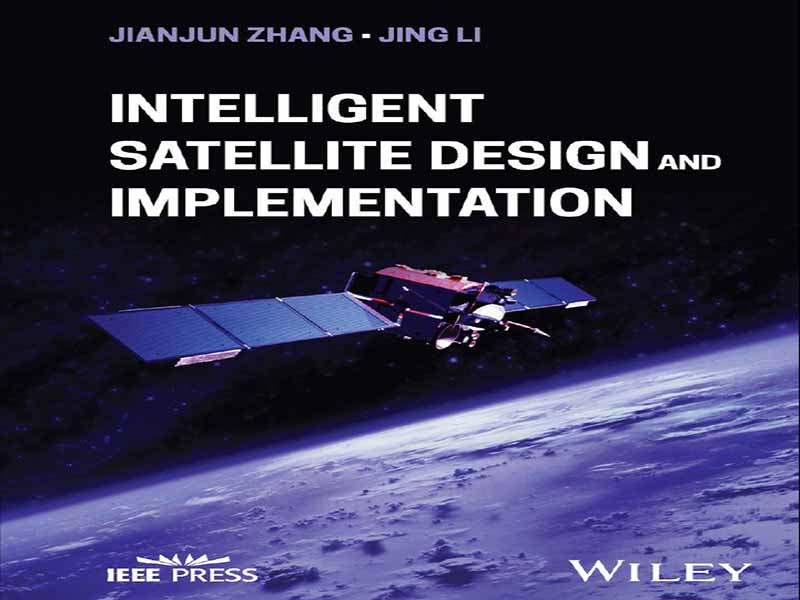- عنوان کتاب: Intelligent Satellite Design and Implementation
- نویسنده: Jianjun Zhang, Jing Li
- حوزه: ساخت ماهواره
- سال انتشار: 2024
- تعداد صفحه: 217
- زبان اصلی: انگلیسی
- نوع فایل: pdf
- حجم فایل: 7.15 مگابایت
هوش مصنوعی (AI) یک موضوع میانرشتهای است که با ادغام علوم کامپیوتر، سایبرنتیک، نظریه اطلاعات، نوروفیزیولوژی، روانشناسی، زبانشناسی، فلسفه و سایر رشتهها توسعه یافته است. این یکی از سه فناوری پیشرفته در قرن بیست و یکم (مهندسی ژنتیک، علوم نانو، هوش مصنوعی) است. از طریق فناوری هوش مصنوعی، ماشینها میتوانند برای برخی از وظایف پیچیده که معمولاً برای انجام آنها به هوش انسانی نیاز است، صلاحیت داشته باشند و در نتیجه عملیات دستی را تا حد زیادی ساده کرده، کارایی تولید را بهبود بخشیده و روابط تولید را بهبود میبخشند. این یک فناوری بسیار نوآورانه و پیشرفته است. در حال حاضر، قدرت فضایی بینالمللی به رهبری ناسا، فضا را به عنوان یک عرصه مهم برای ایفای نقش هوش مصنوعی در نظر گرفته است. بسیاری از وظایف فضایی که انجام شدهاند یا انجام خواهند شد، کم و بیش از فناوری هوش مصنوعی برای بهبود کارایی وظایف مرتبط استفاده کردهاند. اگرچه کاربرد فعلی فناوری هوش مصنوعی در فضا هنوز محدود است و دستاوردها به اندازه کافی برجسته نیستند، اما قدرت هوش مصنوعی نشان داده شده است و جهت توسعه آیندهای که نشان میدهد نیز شروع به ظهور کرده است. کاربرد موفقیتآمیز هوش مصنوعی در زمینههای مختلف، پایه و اساس خوبی را برای طراحی سیستمهای ماهوارهای و توسعه هوش ماهوارهای در آینده ایجاد کرده است. در مجموعهای از فرآیندها مانند توسعه ماهواره، آزمایش، کنترل پرواز، تحویل و استفاده، مشکلات محیط فضایی بدون مراقبت، هزینه بالای آزمایش و نگهداری و بسیاری از عوامل مشکلات نقص، محققان علمی را گیج کرده است. فناوری سیستم ماهوارهای پشتیبانیکننده از هوش مصنوعی ابزاری قدرتمند برای حل این مشکلات است و یکی از مسیرهای توسعه طراحی سیستم ماهوارهای در آینده است. در آینده، این فناوری نه تنها قادر به پردازش اطلاعات کامل خواهد بود، بلکه اطلاعات ناقص را نیز پردازش میکند و حتی اطلاعات ناقص را به صورت هوشمندانه تکمیل میکند و پردازش اطلاعات و دادهها را مطابق با سیستم بازخورد، بالغتر، کارآمدتر و دقیقتر میکند. در عین حال، تجربه به طور مداوم در عملیات روزانه انباشته میشود، به طوری که سیستم هوش مصنوعی میتواند با محیط در حال تغییر سازگار شود، به تدریج مکانیسم تکامل خودکار را تحقق بخشد و خود سیستم هوش مصنوعی را وادار به یادگیری مداوم کند، اطلاعات پردازش غیرفعال منفرد را به اطلاعات پردازش فعال و هوشمند تبدیل کند و حتی توانایی پیشبینی خاصی داشته باشد. با توسعه روزافزون الگوریتمها و فناوریهای کاربردی هوش مصنوعی، توسعه بعدی ماهوارههای هوشمند بر همه جنبهها متمرکز خواهد بود: توسعه طراحی تراشههای هوشمند داخلی برای ایجاد پایه سختافزاری برای هوش ماهوارهای. طراحی سیستم ماهوارهای مبتنی بر هوش مصنوعی را توسعه دهید تا یک پلتفرم پردازشی ایجاد کنید که بتواند گسترش انعطافپذیر وظایف متعدد را برآورده کند و از پیکربندی مجدد انعطافپذیر منابع سیستم در صورت خرابی پشتیبانی کند. فناوری تشخیص و نگهداری خطای مداری مبتنی بر هوش مصنوعی را برای نظارت بر وضعیت مداری ماهواره توسعه دهید. در مورد فناوری کنترل هوشمند ماهوارهای مبتنی بر هوش مصنوعی تحقیق کنید و کاربرد کنترل هوشمند خودکار وضعیت در لحظه، کنترل خودکار موقعیت هوشمند خودکار و فناوری اطلاعات هوشمند را در سیستمها، پلتفرمها و محمولههای کنترل هوافضا تحقق بخشید. در مورد فناوری ادغام ماهواره-زمین مبتنی بر هوش مصنوعی تحقیق کنید و یک پلتفرم ماهوارهای ادغام ماهواره-زمین بسازید. در نهایت، با ترکیب الگوریتم یادگیری هوشمند، وظیفه هوشمند پلتفرم ماهوارهای محقق میشود.
Artificial Intelligence (AI) is an interdisciplinary subject developed by integrating computer science, cybernetics, information theory, neurophysiology, psychology, linguistics, philosophy, and other disciplines. It is one of the three cutting-edge technologies in the 21st century (genetic engineering, nanoscience, AI). Through AI technology, machines can be competent for some complex tasks that usually require human intelligence to complete, thus greatly simplifying manual operations, improving production efficiency, and improving production relations. It is a very disruptive, cutting-edge technology. At present, the international space power led by NASA has taken space as an important stage for AI to play its role. Many space tasks that have been carried out or will be carried out have more or less adopted AI technology to improve the efficiency of related tasks. Although the current application of AI technology in space is still limited and the achievements are not outstanding enough, the power of AI has been demonstrated, and the future development direction it represents has also begun to emerge. The successful application of AI in various fields has laid a good foundation for the design of satellite systems and the development of satellite intelligence in the future. In a series of processes such as satellite development, testing, flight control, delivery and use, the problems of the unattended space environment, the high cost of testing and maintenance, and many factors of fault problems have been puzzling scientific researchers. AI-supporting satellite system technology is a powerful means to solve these problems and is one of the development directions of satellite system design in the future. In the future, it will not only be able to process complete information but also process incomplete information, and even intelligently supplement incomplete information, and make the processing of information and data more mature, efficient, and accurate according to the feedback system. At the same time, experience is constantly accumulated in daily operation, so that the AI system can adapt to the changing environment, gradually realize the automatic evolution mechanism, and make the AI system itself constantly learn, changing the single passive processing information into active, intelligent processing information, and even have a certain predictive ability. With the increasing development of AI algorithms and application technologies, the next development of intelligent satellites will focus on all aspects: developing the design of onboard intelligent chips to lay the hardware foundation for satellite intelligence. Develop satellite system design based on AI to realize a processing platform that can meet the flexible expansion of multiple tasks and support the flexible reconfiguration of system resources in case of failure. Develop the on-orbit fault detection and maintenance technology based on AI to realize the monitoring of satellite on-orbit status. Carry out research on satellite intelligent control technology based on AI, and realize the application of real-time intelligent autonomous attitude control, intelligent autonomous GNC, and intelligent information technology in aerospace control systems, platforms, and payloads. Carry out research on satellite-ground integration technology based on AI and build a satellite-ground integration satellite platform. Finally, combined with intelligent learning algorithm, the intelligent task of satellite platform is realized.
این کتاب را میتوانید از لینک زیر بصورت رایگان دانلود کنید:





































نظرات کاربران